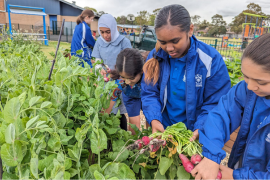Why is organic waste an issue?
In 2023, the Climate Change Act was passed by the NSW Government, committing to a net zero future. Additionally, the NSW Government has set a goal of halving organic waste by 2030 as part of the Waste and Sustainable Materials Strategy 2041.
In support of this, the department has pledged to achieve net zero in operations and eliminate resource waste by 2030 in Our Commitment to Sustainability.
Over half of waste that goes to landfill is organic waste and accounts for over 3% of Australia’s greenhouse gas emissions. When buried in landfill, it decomposes anaerobically, that is, without oxygen and produces methane. Methane is a greenhouse gas that is 25 times more potent than carbon dioxide in trapping heat in the atmosphere.
Food waste is an avoidable economic, social and environmental problem. Not only are we using valuable resources to produce food that is subsequently wasted, we miss the opportunity of turning it into a resource.
We send 1.7 million tonnes of food waste a year to landfill in NSW alone. If we remove food waste from landfill not only do we help solve an environmental problem, but we also avoid paying a landfill levy on it.
Did you know?
- 3% of Australian greenhouse gas emissions is from food waste. Rotting food produces methane - a greenhouse gas which is 25 times more powerful than C02 at trapping heat in the atmosphere.
- Australia uses around 2,600 gigalitres of water to grow food that is wasted. This is equivalent to the water in 5 Sydney Harbours.
- The land used to grow wasted food is over 25 million hectares - bigger than the whole of Victoria.
- It is a waste of money with NSW families estimating that they throw away $2,100 of uneaten food a year.

Image:
Creating value out of organic waste

Image:
Teaching students about caring for our environment
How much food do we waste in NSW schools?
Audits undertaken as part of various department waste initiatives show that organic waste accounts for over one third of all waste generated at a school yet whole of government waste contract data shows that less than 1% is collected as organic waste. The average food waste per student is 7kg per school year. That’s the same weight as 70 single scoop ice creams!

